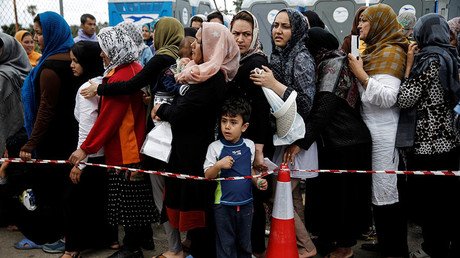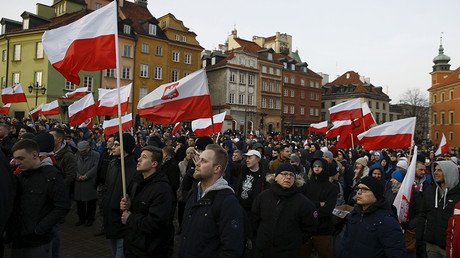‘I want border police!’ Mayor of Polish border town to RT on measures to keep refugees out
A mayor of a Polish town bordering with Germany has adopted strict security measures to keep refugees away. He explained to RT his move follows fears expressed by the town’s residents after calls to share the flow of newcomers between EU member states.
“It all happened after what we heard coming out of Germany. I said I want border police!” Tomasz Ciszewicz, mayor of Slubice, told RT’s Peter Oliver, referring to the EU’s plan to use a mandatory quota system to distribute migrants across the 28-nation bloc, championed by Berlin.
Ciszewicz used city funds to bring in extra policemen to patrol a bridge that connects – or rather – separates Slubice and the German town of Frankfurt-on-Oder. The official also equipped the bridge with surveillance cameras with live feeds broadcast 24/7 straight into his mayoral office.
“The operation has gone quite smoothly, but when they [cameras and policemen] first appeared there was lots of discussion,” Ciszewicz said, insisting the border police and cameras aren't only looking for migrants, but permanently monitor the area around the bridge and check anyone suspicious attempting to cross into Poland, so that they “know now that they cannot simply come here.”
“We just want to feel safe, work study and enjoy the benefits that come from living near the Polish-German border,” the mayor explained his motive to RT’s correspondent.
Poland values the benefits of having joined the EU in 2004, such as cross-border trade with other member-states and an opportunity for Polish citizens to find better paying jobs in Western European countries thanks to the Schengen free travel zone.
However, these same benefits brought a major headache for the country, as refugees granted permission to stay in Germany (or anywhere else in Europe, for that matter) can cross the border unrestricted, attracted to Poland by its lower prices and a favorable currency exchange rate. Poland uses the zloty as its currency rather than the euro.
Under EU rules a refugee is forbidden from working or permanently moving to another EU country, but a refugee who has officially-protected status granted by a member state has a right to travel to other bloc countries temporarily.
READ MORE: Poland steps up police patrols on border as Germany overflows with refugees
This has been causing fear among Polish citizens. Ciszewicz said that the idea to increase security at the bridge came to him after numerous complaints from citizens, who dreaded that refugees may cross into Poland to carry out terrorist attacks.
“I'm afraid of what is happening in cities like Berlin and Hamburg. I think that re-establishing a strict border control would help. People are afraid. I would even agree to closing the borders. This would be better for us,” one Slubice resident told RT.
Another claimed that Germany is so overflowing with migrants that one can hardly meet a native German in the capital.
“Germany is all black now, I was in Berlin just two days ago, I couldn't see a native German. I don't know what will be the situation there in the future…”
As Poland is the EU’s most homogenous country with some 90 per cent of citizens Catholic and but a few small immigrant communities, the urge to defend the country’s cultural identity is shared by many. In this regard, one resident has said she was up for closing the borders entirely, to keep newcomers away.
“I think that the best way to stop refugees is to behave like Hungary, and build a massive wall and not let them in. Among them are mostly young men, why do they run away?” the woman said.
Germany received almost 180,000 asylum applications in the first quarter of 2016. Poland had less than 300, while its existing migrant quota is some 6,500 refugees. And despite the European Commission’s proposal to fine EU members for refusing to accept migrants, Poland has been speaking freely of its stance on admitting newcomers.
“After recent events connected with acts of terrorism, [Poland] will not accept refugees because there is no mechanism that would ensure security,” the head Poland’s ruling Law and Justice party (PiS) and former PM Jaroslaw Kaczynski said recently. “This is the position of the prime minister and the whole of PiS […] From the beginning we felt that this issue should be resolved [by] assisting refugees outside the EU.”














